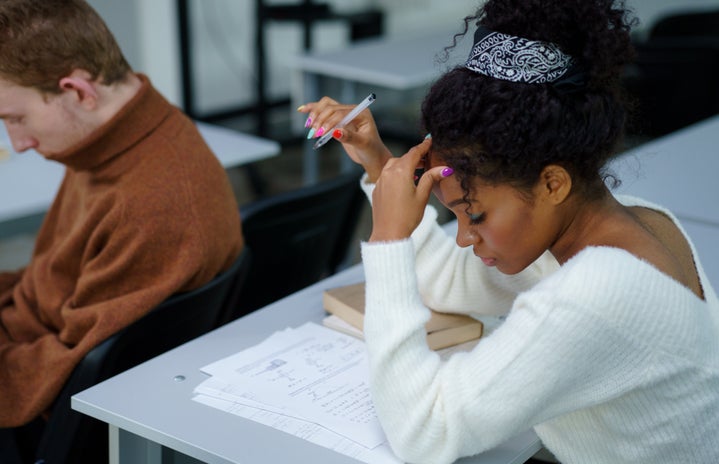As a commuter, coming back to campus this fall has been both a blessing and a curse. While I have a strong preference for in-person classes (I will not miss 3-hour Zoom lectures), the return to campus has also meant a return to spending hours in a car each day and struggling to balance my on- and off-campus commitments. On top of this, it has always been difficult to set boundaries with my job on maintaining a manageable schedule each week.
This is the beginning of my last year at GMU before becoming a “real” adult, and I am determined to live it to the fullest. In previous years, I always found myself saying that I would make time to be on campus outside of class to see my friends, attend that club meeting or just have a main character moment in the Northern Neck Starbucks.
Spoiler alert: this never happened.
Throughout the COVID-19 pandemic, I had a lot of regrets about not taking advantage of my time on campus and allowing myself to get so sucked into a rinse-and-repeat cycle of driving to campus, then driving to work and then driving home.
Now, it feels like everything can get taken away again in the blink of an eye — especially with rising cases of the delta variant — and it’s finally time to commit to doing things differently.
While I am busier than ever, I have found a few tricks to balance all of my competing interests and still leave a little time left over at the end of the night.
Maintain your planner — even after Syllabus Week.
I’m very guilty of starting the semester off by using a planner to keep track of readings, major due dates, RSO meetings and shifts and then dropping it a few weeks later. It seems clichéto say, but writing down your priorities really does help and can be a great way to feel prepared to tackle your list every day.
This semester, the most helpful thing has been allowing myself to use my planner how it most benefits me, even if that means not writing in it every day or not using every page the way it was intended. As someone with ADHD, I always struggled with keeping up with a daily planner and after missing a few days, found myself overwhelmed by the idea of picking it back up and seeing all of the blank space I’d left.
This summer, I picked up this undated Moleskine project planner for my summer classes and it has been a game changer. It isn’t as pretty as the Erin Condren or Happy Planners I’ve used before, but it gives me the flexibility to customize when and how I use it. Plus, if I miss a week I am able to just start my next week immediately — no blank pages!
Get comfortable with setting boundaries.
I have always had a very difficult time taking time off work and have struggled with feeling guilty about requesting days off because I already work a less flexible schedule than my coworkers and I end up feeling like I “owe” my boss to work every day I am available.
If you find yourself struggling with the same feelings, let me be the one to tell you: that’s how they want you to feel.
In a capitalist society, our value is measured in terms of our productivity. How many hours do you work? How many classes do you take? How many organizations are you in? Whether they intend to or not, our employers play a huge part in enforcing this because they directly benefit from us buying into the system. If you never take a day off, not only are you generating more revenue for them, but you are also enabling them to take that time off themselves.
You aren’t superhuman. There isn’t enough time in the day to take 15 or 16 credits, do all of the work related to those classes, work 35+ hours and have any time to have other commitments — let alone take time each day to prioritize your mental health — and it’s time to stop allowing people in positions of authority over us to make it our problem that we can’t balance it all. Next time you’re redoing your availability or deciding whether to go on that girl’s trip and take a weekend off, don’t worry about what your boss would think.
Self-care time *is* productive time.
We all need time to recharge our social batteries, especially after spending so much time alone over the past year. Experiencing social fatigue is both normal and to be expected at the end of a long week. Carving out time to be alone and just veg out on Twitch streams or scroll the For You Page on TikTok might feel like a waste of time, but it is so important to maintaining your mental and physical health.
Now is a great time to pick up that skincare routine you crafted at the beginning of quarantine or check back in with the villagers on your Animal Crossing island that you haven’t touched since last summer and build time into your schedule to focus on decompressing.
Just because we’ve returned to campus, it doesn’t mean you have to be ready to return to “normal.”
We are still in a global pandemic and we have witnessed a horrifying loss of human life that will be remembered as a profoundly impactful generational trauma. We are still processing the last year, and those who have been impacted have likely not even begun the process of healing from this experience.
The return to “normal” can feel very uncomfortable and anxiety-inducing, it’s imperative that we are gentle with ourselves and don’t take on too much too fast. I, as a retail manager, have been working with the public throughout the vast majority of the pandemic and would — in theory — have become desensitized to being around countless, unmasked, potentially unvaccinated people outside of my household; but I still find myself needing to draw lines around what I am and am not comfortable doing right now.
It’s okay if you’re not at the same point as your friends and peers are, don’t push yourself for the sake of not feeling like you’re behind everyone else and end up in a situation that could be detrimental to your health.
Let’s get this bread, — in a healthy and sustainable way — collegiettes.


